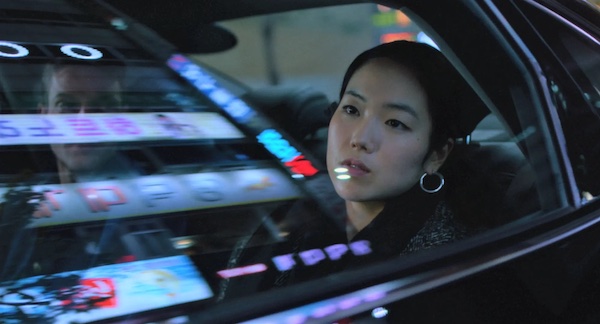Film Review: Seoul Mates
By Peter Keough
In this complex and enigmatic film, director Davy Chou has skillfully conjured up both a sense of time’s passage and a mood of timelessness.
Return to Seoul, written and directed by Davy Chou. Screening at the Kendall Square Cinema and the West Newton Cinema.

Park Ji-Min in Return to Seoul. Photo: Thomas Favel/Aurora Films/Sony Pictures Classics.
The story of Oedipus offers a warning against looking too deeply into one’s origins. It also shows why the temptation to do so can be hard to resist. Such is the fate of Freddie (Park Ji-Min) a Korean-born 25-year-old woman adopted as an infant by a French couple, who finds herself spending an unplanned (consciously anyway) two-week sojourn in the title city in Davy Chou’s complex and enigmatic Return to Seoul. There she befriends Tena (Guka Han), the francophone receptionist at the hotel where she is staying, who asks her while they have a drink at the bar if she plans to locate her biological parents while she’s in town. Freddie says no. “Why not? Tena asks.
The rest of the film, which unfolds over several years, might be seen as an answer to that question. Though she seems indifferent at first, Freddie can’t shake off Tena’s suggestion. She leaves behind a trail of hurt feelings and wrecked relationships as she attempts to escape from or connect with her past. What makes her quest intriguing is that she’s a protean, truculent, stubborn protagonist — not always easy to like, but impossible to ignore. Chou remarked on this choice in an interview: Freddie is not “what you expect or imagine of how female Asian characters are represented in films. Often, they are delicate heroines. In this case, we have an explosive character who isn’t just a nice girl and who goes against the grain.”
Freddie demonstrates this contrariness when she initially responds to the question “why not?” by dancing off to a song on the jukebox, gathering a bunch of random people together, sitting them at a table, and engaging them in confused, multilingual drinking games. She wakes up the next morning, hung over and naked in bed with a stranger. Neither of them remembers if they had sex the night before so Freddie asks him if he wants to do it now. He obliges, and she doesn’t notice or doesn’t care that the young man has fallen in love with her.
With similar seeming capriciousness Freddie decides to meet with her biological parents. Her mother does not respond to her query, but her father (a haunting and menacing Oh Kwang-Rok) does. During a torturous dinner he grows increasingly inebriated and begs her to stay with him in Korea while his wife plies her with food and his mother gushes with pious, teary apologies for the family having abandoned her as an infant. Freddie regards it all with an expression of incredulity and horror. Afterwards, her father ceaselessly texts her like a besotted stalker. “It’s the way of Korean men,” Tena explains when Freddie complains to her about it. “I’m French,” says Freddie. “You think I want to become a good little Korean girl?”
Two years pass, Freddie is in Seoul again, and her entrance dispels any doubt that she might have become a good little Korean girl. Dressed in the carapace of a black leather jacket, she strides into a bar and settles in next to André (Louis-Do de Lencquesaing), a suave, middle-aged French arms dealer. She tells him she works for a French international consulting company and likes “old guys.” Taken aback by her bemused aplomb and macho assertiveness, André says she must operate like a “Trojan horse” at her job and that she’d be lethal in his line of work because, like her, “you have to be able to not look back.”
But she does look back. She returns to Seoul five years later – she’s taken up Andre’s suggestion to enter his trade and is now working with him selling weapons to her native country. She’s also quit drinking, stopped eating meat, resumed her relationship with her father, and has acquired a French boyfriend – Maxime (Yoann Zimmer). The latter she brings with her as moral support to another excruciating dinner with her dad. As they leave the restaurant, Maxime indiscreetly notes that she resembles her father. Distraught, Freddie grumbles at him, “I could wipe you from my life with a snap of my fingers.”
If only she could do the same with those who gave her life, you’d think. Not just her father, but her mother, who, after years of declining to respond to her repeated requests, finally agrees to see her. The scene unfolds with ritualistic slowness, as a counselor from the adoption agency instructs Freddie in the protocol of the meeting and an old man brings tea and announces her mother’s arrival. When she enters, Freddie weeps for the first time in the film. Her mother asks if she can touch her and their embrace is like a Pietà.
This is one of a handful of epiphanies that anchor the film. Throughout, Chou has skillfully conjured up both a sense of time’s passage and a mood of timelessness. His unsparing closeups of Freddie’s face — coupled with Park’s raw and elusive performance (she has never acted in a film before) — underline the story’s Oedipal resonances: the subjective experience of an unknowable soul and the tragedy of our common fate.
Peter Keough writes about film and other topics and has contributed to numerous publications. He had been the film editor of the Boston Phoenix from 1989 to its demise in 2013 and has edited three books on film, most recently For Kids of All Ages: The National Society of Film Critics on Children’s Movies (Rowman & Littlefield, 2019).
